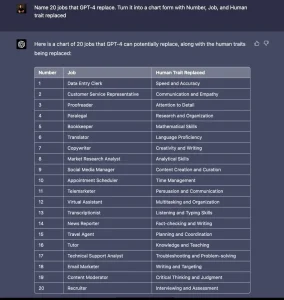Introduction
In recent years, artificial intelligence (AI) has transitioned from a niche area of technology to a fundamental component of various industries, reshaping the landscape of the job market. The rapid growth of AI technologies has led to significant advancements in automation, data analysis, and decision-making processes, making it imperative for professionals and students alike to understand and harness these skills.
- Overview of AI and Its Rapid Growth: AI encompasses a range of technologies, including machine learning, natural language processing, and robotics, which are increasingly integrated into everyday applications. From voice assistants to recommendation systems, AI is now ubiquitous, influencing how businesses operate and how consumers interact with technology [11]. The expansion of AI capabilities has not only enhanced efficiency but also opened new avenues for innovation across sectors.
- Statistics on Job Market Demand for AI Skills: The demand for AI-related skills is surging, with numerous reports indicating a significant skills gap in the workforce. For instance, job postings requiring AI expertise have seen exponential growth, with many companies actively seeking professionals who can manage and implement AI solutions. This trend highlights the urgent need for educational programs and training that equip individuals with the necessary competencies to thrive in an AI-driven economy [3][5].
- Thesis Statement: As the job market continues to evolve, acquiring AI skills is no longer optional; it is essential for future career success. Professionals who invest in learning AI will not only enhance their employability but also position themselves at the forefront of innovation, ready to tackle the challenges and opportunities that lie ahead in an increasingly automated world [8][10].
The Rise of AI in Various Industries
As we navigate through the 21st century, the integration of Artificial Intelligence (AI) into various sectors is not just a trend; it is a transformative force reshaping the landscape of work and innovation. Understanding the significance of AI is crucial for professionals and students alike, as it opens up a plethora of career opportunities and enhances employability. Here are some key points illustrating the broad application of AI across different industries:
1. Industries Transformed by AI
- Healthcare: AI is revolutionizing patient care through predictive analytics, personalized medicine, and robotic surgeries. For instance, AI algorithms can analyze medical images with remarkable accuracy, assisting radiologists in diagnosing conditions earlier and more accurately. This not only improves patient outcomes but also streamlines operations within healthcare facilities [1].
- Finance: In the financial sector, AI is utilized for fraud detection, risk management, and algorithmic trading. Financial institutions leverage machine learning models to analyze transaction patterns and identify anomalies, significantly reducing the risk of fraud. Additionally, AI-driven chatbots enhance customer service by providing instant support and personalized financial advice [2].
- Marketing: AI has transformed marketing strategies by enabling data-driven decision-making. Companies use AI to analyze consumer behavior, segment audiences, and optimize ad placements. For example, AI tools can predict which products a customer is likely to purchase based on their browsing history, allowing for targeted marketing campaigns that yield higher conversion rates [3].
2. Case Studies of Successful AI Implementation
- Google: Google has successfully integrated AI into its search algorithms, improving the relevance of search results and enhancing user experience. The use of AI in Google Photos, which allows users to search for images based on content, showcases the practical applications of AI in everyday life [4].
- IBM Watson: IBM’s Watson has made significant strides in healthcare by assisting oncologists in diagnosing cancer. By analyzing vast amounts of medical literature and patient data, Watson provides evidence-based treatment recommendations, demonstrating how AI can augment human expertise in critical fields [5].
- Amazon: Amazon employs AI in its logistics and supply chain management, optimizing inventory levels and predicting demand. The use of AI in its recommendation engine has also been pivotal in driving sales, as it personalizes the shopping experience for millions of users [6].
3. Impact of AI on Job Roles
The rise of AI is reshaping job roles across industries. While some positions may become automated, new roles are emerging that require a blend of technical and analytical skills. For instance:
- Data Scientists: As organizations increasingly rely on data-driven insights, the demand for data scientists who can interpret complex datasets and develop AI models is surging. This role is pivotal in harnessing the power of AI to drive business decisions [7].
- AI Ethics Specialists: With the growing concern over ethical implications of AI, there is a rising need for professionals who can navigate the ethical landscape of AI deployment, ensuring that technologies are used responsibly and equitably [8].
- AI Trainers: As AI systems require continuous learning and adaptation, the role of AI trainers who can teach machines to improve their performance is becoming essential. This role combines knowledge of AI technologies with domain expertise [9].
AI Skills in Demand: What Employers Are Looking For
As the landscape of the job market evolves, the demand for artificial intelligence (AI) skills is surging across various industries. Professionals and students aiming to enhance their career prospects must recognize that learning AI is no longer optional; it is essential. Here’s an overview of the key AI-related skills that employers are actively seeking, along with the importance of soft skills and insights from job postings.
Key AI-Related Skills
- Machine Learning (ML):
- Natural Language Processing (NLP):
- Data Analysis and Visualization:
- AI Ethics and Responsible AI Development:
- Programming Proficiency:
Importance of Soft Skills
While technical skills are paramount, soft skills are equally important in the AI job market. Employers are increasingly valuing:
- Problem-Solving: The ability to approach complex challenges with innovative solutions is essential in AI roles, where unexpected issues often arise during model development and deployment [8][10].
- Adaptability: The rapid pace of technological change in AI requires professionals to be flexible and willing to learn continuously. Adaptability ensures that individuals can keep up with evolving tools and methodologies [8][10].
Insights from Job Postings
Recent analyses of job postings reveal a clear trend: the skills required for AI positions are evolving at a remarkable pace. For instance, over 60% of businesses reported difficulties in hiring qualified AI professionals, indicating a significant skills gap in the market [2][10]. The demand for roles such as machine learning engineers and AI data scientists is particularly high, with employers emphasizing the need for both technical expertise and soft skills [2][10].
Career Paths Enhanced by AI Knowledge
Understanding artificial intelligence (AI) is becoming increasingly essential across various career paths. As AI technologies continue to advance, they are not only creating new job roles but also transforming traditional positions. Here’s a closer look at how AI knowledge is enhancing career opportunities and why it is crucial for professionals and students alike.
Emerging Job Roles
- AI Specialist: This role focuses on developing and implementing AI solutions. AI specialists are responsible for designing algorithms and models that enable machines to learn from data. As businesses increasingly rely on AI for decision-making, the demand for skilled professionals in this area is surging.
- Data Scientist: Data scientists analyze complex data sets to derive actionable insights. With AI tools, they can enhance their analytical capabilities, making them invaluable in sectors like healthcare, finance, and marketing. The integration of AI allows data scientists to automate data processing and improve predictive analytics.
- AI Ethicist: As AI technologies raise ethical concerns, the role of AI ethicists is becoming critical. These professionals ensure that AI systems are developed and used responsibly, addressing issues such as bias, privacy, and accountability. Their expertise is essential in guiding organizations through the ethical implications of AI deployment.
Evolution of Traditional Roles
AI is not only creating new job opportunities but also reshaping existing roles across various industries:
- Marketing: AI tools are revolutionizing marketing strategies by enabling personalized customer experiences and predictive analytics. Marketers who understand AI can leverage these technologies to optimize campaigns and improve customer engagement.
- Finance: In finance, AI is streamlining processes such as risk assessment and fraud detection. Financial professionals with AI knowledge can enhance their analytical skills, leading to better investment strategies and improved client services.
- Human Resources: AI is transforming recruitment processes through automated resume screening and candidate matching. HR professionals who are adept at using AI tools can improve hiring efficiency and enhance employee engagement.
Benefits of AI Literacy
Acquiring AI skills offers numerous advantages for career advancement and job security:
- Increased Employability: As AI becomes integral to various industries, professionals with AI literacy are more attractive to employers. Understanding AI can set candidates apart in a competitive job market, making them more likely to secure desirable positions.
- Career Advancement: Knowledge of AI can lead to promotions and new opportunities within organizations. Professionals who can harness AI technologies are often seen as leaders in innovation, positioning themselves for higher-level roles.
- Job Security: As automation becomes more prevalent, roles that require AI skills are less likely to be outsourced or automated. Professionals equipped with AI knowledge can adapt to changing job requirements, ensuring their relevance in the workforce.
How to Start Learning AI
As the demand for artificial intelligence (AI) skills continues to rise across various industries, professionals and students alike are recognizing the importance of integrating AI knowledge into their career development. Here are actionable steps to embark on your AI learning journey:
Recommended Online Courses and Certifications
- Online Learning Platforms: Enrolling in structured online courses is one of the most effective ways to learn AI. Platforms like Coursera, Simplilearn, and edX offer a variety of courses that cover fundamental concepts and advanced topics in AI and machine learning. These courses often break down complex subjects into manageable segments, making it easier for learners to build confidence and apply their skills in real-world scenarios [1][12].
- Specialized Programs: For those with some foundational knowledge, advanced programs such as the Machine Learning or Generative AI Nanodegree can provide deeper insights and specialized skills that are highly sought after in the job market [12].
Importance of Hands-On Experience
- Internships and Projects: Gaining practical experience is crucial in the AI field. Engaging in internships or working on personal projects allows learners to apply theoretical knowledge in real-world situations. This hands-on experience not only enhances understanding but also makes candidates more attractive to potential employers [9][15].
- Collaborative Learning: Participating in group projects or hackathons can also provide valuable experience. These collaborative environments foster teamwork and problem-solving skills, which are essential in AI roles [5][9].
Resources for Continuous Learning and Staying Updated in AI
- Research Papers and Blogs: The AI field is rapidly evolving, making it essential to stay informed about the latest developments. Regularly reading research papers and following reputable AI blogs can help learners keep up with new technologies, methodologies, and ethical considerations in AI [7][11].
- Networking and Community Engagement: Joining AI-focused communities, attending workshops, and participating in forums can provide additional learning opportunities and insights from industry professionals. Networking can also lead to mentorship opportunities and collaborations that further enhance learning [9][10].
The Future of Work: Embracing AI
As we navigate through the 21st century, the landscape of work is undergoing a profound transformation driven by advancements in artificial intelligence (AI). Understanding the implications of AI on various career paths is crucial for both professionals and students aiming to enhance their career prospects. Here are some key points to consider regarding why learning AI is essential:
Predictions for AI’s Role in Job Creation and Automation
- Job Transformation: AI is not just about replacing jobs; it is also about creating new opportunities. While certain roles may become automated, AI has the potential to generate new jobs that require advanced skills in data analysis, machine learning, and AI management. This shift is similar to past technological revolutions that led to the emergence of entirely new industries and job categories [6].
- Impact on Various Sectors: AI is versatile and is being integrated into numerous fields, including healthcare, finance, automotive, and more. This integration enhances efficiency and decision-making processes, indicating that professionals equipped with AI skills will be in high demand across diverse sectors [2][11].
The Necessity of a Growth Mindset in a Rapidly Changing Job Landscape
- Adaptability is Key: The rapid evolution of AI technologies necessitates a growth mindset among professionals. Embracing continuous learning and upskilling is essential to remain competitive in the job market. As AI becomes more prevalent, those who are willing to adapt and learn will find themselves better positioned for career advancement [8][14].
- AI Literacy: Understanding AI tools and methodologies is becoming a fundamental requirement in the modern workforce. This includes knowledge of natural language processing, machine learning, and data analytics. Professionals who invest time in developing AI literacy will not only enhance their employability but also contribute to their organizations’ success [15].
Embracing AI as an Opportunity Rather Than a Threat
- Future-Proofing Careers: Learning AI is a proactive step towards future-proofing one’s career. As AI continues to evolve, possessing relevant skills will ensure that individuals remain valuable assets in their respective fields. This adaptability reduces vulnerability to job displacement caused by automation [14].
- Networking and Collaboration: Engaging with AI education provides opportunities to connect with global experts and like-minded professionals. This networking can lead to collaborations that further enhance career prospects and innovation within industries [9].
Conclusion
In today’s rapidly evolving job market, the importance of learning artificial intelligence (AI) cannot be overstated. As AI continues to reshape industries and redefine job roles, acquiring AI skills has become essential for both professionals and students aiming to enhance their career prospects. Here are the key reasons why investing in AI education is crucial:
- Essential for Career Development: AI is not merely a technological advancement; it is a fundamental driver of change across various sectors. Understanding AI equips individuals with the necessary skills to thrive in a landscape where AI integration is increasingly normalized and expected. This knowledge not only safeguards against job displacement but also opens doors to specialized career paths such as AI ethics specialists, AI trainers, and AI explainability experts [6][14].
- Urgency to Act: The demand for AI skills is on the rise, making it imperative for individuals to take proactive steps in their education. By embracing AI learning, professionals can position themselves as valuable assets in their organizations, while students can prepare for a future where AI literacy is a prerequisite for success [10][11].
- Transformative Potential: The transformative potential of AI skills extends beyond individual career advancement; it has the power to reshape entire industries. As organizations increasingly rely on AI for data handling, automation, and decision-making, those equipped with AI knowledge will be at the forefront of innovation and change [5][14].
In conclusion, the urgency to learn AI is clear. Whether you are a professional seeking to enhance your skill set or a student preparing for the future job market, investing in AI education is no longer optional. Embrace the opportunity to unlock your potential and be part of the AI-driven future.
Find out more about Shaun Stoltz https://www.shaunstoltz.com/about/
This post was written by an AI and reviewed/edited by a human.



